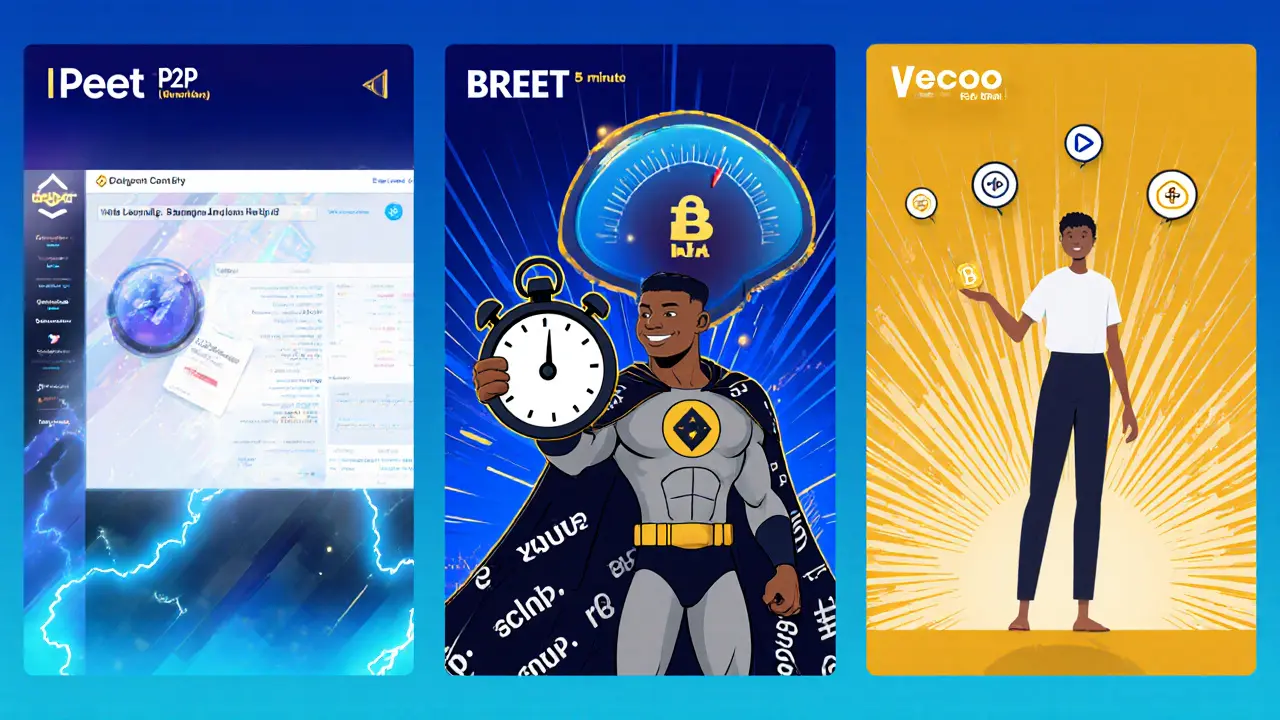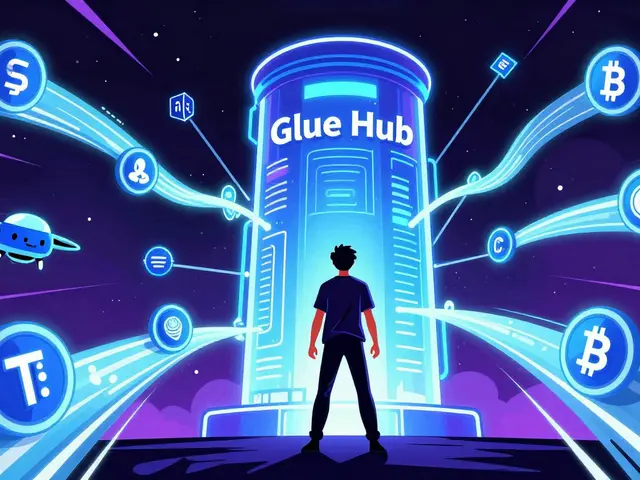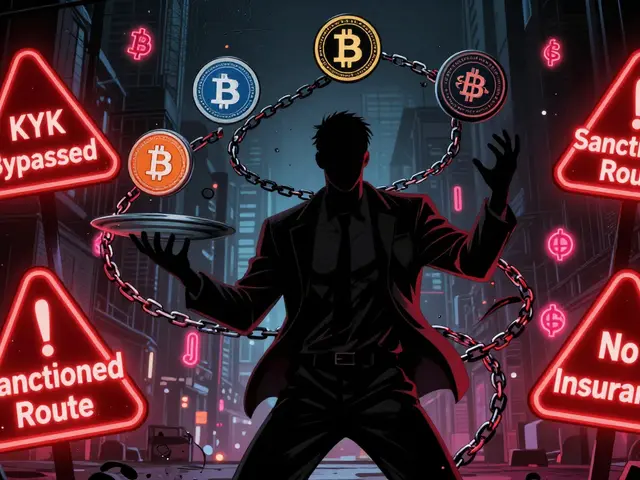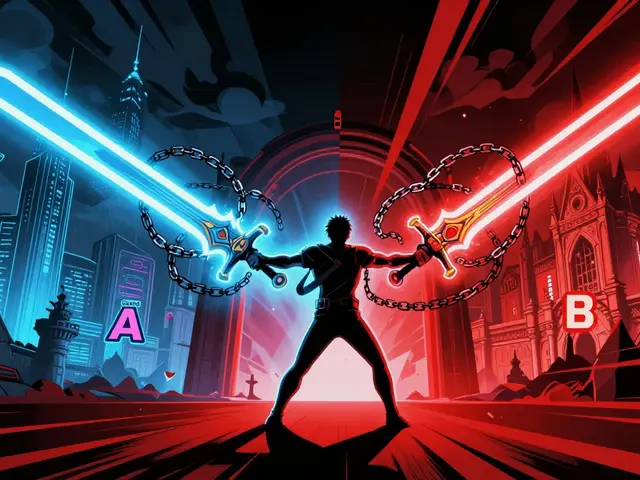- Home
- Cryptocurrency
- Nigeria’s P2P Crypto Trading Boom: Top Peer-to-Peer Platforms in 2025

Nigeria’s P2P Crypto Trading Boom: Top Peer-to-Peer Platforms in 2025
Nigeria P2P Crypto Platform Comparison Tool
Find Your Ideal P2P Platform
73% of Nigerian traders prioritize transaction speed. Select what matters most to you and see which platform wins for your needs.
Speed Champion
Most Transactions Completed in <5 MinutesBreet
#1 Speed98% of transactions complete within 5 minutes
- 0.2% flat fee
- Instant bank payouts
- 97% user satisfaction rate
Ideal for quick transactions. Recommended for users who need to move funds fast.
Lowest Fees
Zero Trading FeesYellowCard
#1 Fee-Free0% trading fees
- 15 supported cryptocurrencies
- Instant Naira deposits/withdrawals
- 2FA security
Best for small transactions (under ₦500,000). Ideal for users trading frequently with small amounts.
Most Cryptos
519 CryptosBinance P2P
#1 Variety519 supported cryptocurrencies
- 0.1% taker/maker fees
- Escrow protection
- 24/7 support
Best for users who want access to the widest range of cryptocurrencies. Most popular platform with 45% market share.
Most Secure
SEC LicensedBusha
SEC LicensedSEC-licensed platform
- Quarterly security audits
- Cold-wallet storage
- 24/7 monitoring
Ideal for users concerned about security. Best choice for larger transactions where security is paramount.
How to Choose Your Platform
Key Considerations
- Speed: Breet is fastest (98% under 5 mins)
- Cost: YellowCard has 0% trading fees
- Crypto Variety: Binance P2P offers 519 tokens
- Security: Busha has SEC licensing
Quick Takeaways
- Nigeria processes over $500million in P2P crypto trades each month.
- Binance P2P holds roughly 45% of the market, followed by Bybit and YellowCard.
- The Investments and Securities Act (ISA2025) gave the SEC clear authority, cutting scam reports by 63%.
- Speed matters most - 73% of users pick a platform based on transaction time.
- Future growth is projected at 27% annually, with the market possibly hitting $5.1billion by 2027.
In Nigeria, P2P crypto trading is a decentralized marketplace where individuals buy and sell digital assets directly using the local Naira, bypassing traditional banks. The boom started when inflation peaked above 24% in 2023 and the Naira lost more than three‑quarters of its value against the dollar. Today, the country ranks second worldwide for crypto adoption, and peer‑to‑peer platforms have become the go‑to way for Nigerians to hedge inflation, send remittances, and access financial services without a bank account.
Why P2P crypto exploded in Nigeria
Think about the last time you tried to send money abroad and paid an 8% fee. For many Nigerians, that was a regular pain point. P2P platforms cut those fees to single‑digit percentages, often under 2%, and they do it in minutes, not days. Add a young, tech‑savvy population (78% of users are under 35) and a 36% adult unbanked rate, and you have a perfect storm for a digital cash alternative.
Industry estimates from TechInAfrica put monthly P2P transaction volume at over $500million in October2025. That’s equivalent to roughly 68% of all crypto activity in the country - far above the global average of 29%.
Regulatory shift: ISA2025 and the SEC
For years, the Central Bank of Nigeria (CBN) sent mixed signals: a 2021 ban on banks dealing with crypto businesses, then a 2023 reversal that allowed licensed firms to operate. The real game‑changer arrived in early2025 with the Investments and Securities Act (ISA2025). The act empowered the Securities and Exchange Commission (SEC) to register and supervise digital‑asset platforms.
Since the SEC’s rollout, scam incidents fell 63% compared with Q42024, according to ChainUp. However, licensing bottlenecks gave early‑approved platforms like Busha and Quidax a temporary edge, and the market still sees occasional fraud attempts - 22% of Q22025 fraud reports involved impersonating verified sellers.

Major peer‑to‑peer platforms - what they offer
Below is a snapshot of the seven platforms that dominate the Nigerian scene as of October2025. Each entry includes fee structure, crypto coverage, and standout features.
| Platform | Fees | Cryptocurrencies supported | Key payment methods | Security highlights | Market share |
|---|---|---|---|---|---|
| Binance P2P | 0.1% taker/maker | 519 | Bank transfer, mobile money, USSD | Escrow, 24/7 support, dispute resolution 89% satisfaction | ≈45% |
| Bybit | 0.1% taker/maker | 519 | Bank transfer, card payments | Local language support (Yoruba, Igbo, Hausa), 12‑15% faster processing | ≈22% |
| YellowCard | 0% trading fee | 15 (BTC, ETH, USDT…) | Instant Naira deposits/withdrawals | 2FA, encrypted wallets, 120+ tutorial videos | ≈15% |
| Breet | 0.2% flat | 12 | Instant bank payouts | 97% user satisfaction, average 3‑minute completion | ≈6% |
| Remitano | 0.25% per trade | Bitcoin only (P2P matching service) | 5 payment methods, cross‑border focus | Simple UI, but limited crypto range | ≈4% |
| Busha | 0.15% taker/maker | 30+ | Bank transfer, card, USSD | SEC‑licensed, quarterly security audits | ≈5% |
| Quidax | 0.2% taker/maker | 25 | Bank transfer, mobile money | Cold‑wallet storage, monthly penetration testing | ≈3% |
Speed, fees, and user experience - who leads?
When you ask a Nigerian trader what matters most, the answer is almost always “how fast my money lands.” A NairaCompare survey of 1,200 users ranked payment speed ahead of fees, security, and coin variety. Breet tops the speed chart - 98% of its trades finish within five minutes, while the industry average hovers between 15 and 30 minutes.
Binance still dominates by volume because of its massive crypto list (519 tokens) and the newly launched “Naira Direct” feature that shaved 38% off average transaction time. Bybit’s local language support gives it an edge for users who prefer help in Hausa or Yoruba, and its integration with Nigerian banks cuts processing delays by 12‑15% according to analyst Shennon Hewa.
YellowCard wins the “no‑fee” battle, making it attractive for small‑ticket traders (most Nigerians move under ₦500,000 per trade). However, users sometimes see rate slippage of up to 2.7% during volatile periods - a trade‑off for the fee‑free model.
Security, scams, and best practices
Even with a 63% drop in reported scams, fraud remains a reality. The Economic and Financial Crimes Commission (EFCC) says 22% of Q22025 crypto fraud cases involved impersonating verified sellers on P2P sites. Common tricks include fake bank‑statement screenshots and “urgent” payment requests.
Most platforms advertise two‑factor authentication (2FA), yet a TechInAfrica study found 68% of Nigerian users disable it because SMS delivery is unreliable. That creates a vulnerable window for attackers.
Here’s a quick checklist you can follow:
- Enable 2FA using an authenticator app rather than SMS.
- Never share your bank login details - reputable platforms never ask for them.
- Use the platform’s escrow service; release funds only after you’ve confirmed receipt.
- Check the seller’s verification badge and recent transaction history.
- Start with a small amount (₦10,000-₦20,000) to test the process.
Community hubs like the r/NigeriaCrypto subreddit and dozens of Telegram groups are valuable places to spot emerging scams. Users who report suspicious offers early help keep the ecosystem healthier.

Getting started: a step‑by‑step guide
If you’re new, the learning curve isn’t steep. Most beginners finish the initial setup in 2‑3hours.
- Choose a platform. For speed, try Breet; for variety, Binance or Bybit; for zero fees, YellowCard.
- Create an account. Provide your phone number, email, and a government‑issued ID. The KYC process typically takes 15‑30minutes.
- Link a payment method. Bank transfer is most common; some platforms also accept mobile‑money wallets.
- Deposit Naira. Follow the platform’s guide - most deposits are instant.
- Place a trade. Select the cryptocurrency, enter the amount, and choose a counter‑party with a good rating.
- Confirm receipt. Once the seller releases the crypto, you’ll see it in your wallet. Withdraw to your bank or keep it on the platform for future trades.
Most platforms have in‑app tutorials. YellowCard, for example, offers 120+ localized videos that walk you through each step in English, Hausa, Yoruba, and Igbo.
Future outlook: growth and challenges
Analysts at ChainUp project the Nigerian P2P market to grow 27% annually through 2027, potentially reaching $5.1billion. The SEC’s July2025 mandate for real‑time transaction monitoring will push platforms to invest in compliance tech, but it also raises confidence for institutional entrants.
Risks linger. A 23% probability of stricter regulations could tighten KYC thresholds, making entry harder for unbanked users. Rural connectivity is another hurdle - 31% of potential users lack stable internet, limiting platform reach.
Nevertheless, the sector’s resilience shows. Institutional interest is climbing, with predictions that 40% of licensed platforms will host corporate accounts by 2026. If the SEC continues to provide clear guidelines, we may see traditional banks partnering with P2P services, blending the best of both worlds.
Frequently Asked Questions
What is the main advantage of P2P crypto trading in Nigeria?
It lets you buy and sell digital assets directly with fellow Nigerians using Naira, cutting out bank fees and often completing trades in under 5minutes.
Which platform is fastest for cash‑out?
Breet consistently posts 98% of transactions finished within five minutes, making it the speed champion.
Are P2P platforms safe from scams?
Safety has improved - scams dropped 63% after the ISA2025 reforms - but you still need to use escrow, enable 2FA, and verify sellers before trading.
Do I need a bank account to trade?
A bank account is the most common way to deposit and withdraw Naira, but some platforms also accept mobile‑money wallets, allowing partially unbanked users to participate.
How will new regulations affect my trading?
The SEC’s real‑time monitoring requirement will likely increase verification steps, but it also means higher platform reliability and lower fraud risk, which is good for long‑term traders.
Cormac Riverton
I'm a blockchain analyst and private investor specializing in cryptocurrencies and equity markets. I research tokenomics, on-chain data, and market microstructure, and advise startups on exchange listings. I also write practical explainers and strategy notes for retail traders and fund teams. My work blends quantitative analysis with clear storytelling to make complex systems understandable.
12 Comments
Write a comment Cancel reply
About
DEX Maniac is your hub for blockchain knowledge, cryptocurrencies, and global markets. Explore guides on crypto coins, DeFi, and decentralized exchanges with clear, actionable insights. Compare crypto exchanges, track airdrop opportunities, and follow timely market analysis across crypto and stocks. Stay informed with curated news, tools, and insights for smarter decisions.







If you’re chasing speed, Breet is the obvious pick – their 98% sub‑5‑minute completion rate is hard to beat. Pair that with a quick KYC run and you’ll be swapping in under an hour, even if you’re new to the scene. Keep your 2FA on, and always verify the seller’s badge before you hit “release”. The escrow feature on Breet works like a safety net, so you don’t lose funds if something goes sideways. Remember, the fastest platform still needs a disciplined approach to stay safe.
When you look at the ISA2025 reforms, you see more than just a regulatory checkbox; it’s a signal that the market is maturing. The SEC’s authority to supervise platforms has already pruned out a lot of the low‑grade operators, which in turn lifts confidence for serious traders. However, the licensing bottleneck means that early‑approved services like Busha still enjoy a temporary moat. In the long run, those who can navigate the compliance tide will shape the next wave of institutional entry.
Binance has the most coins but the fees feel like a hidden tax.
Let’s break down why Binance still dominates despite Breet’s speed lead. First, the sheer variety – over five hundred tokens means you can hop onto any hype before it spikes. Second, the “Naira Direct” feature actually trims transaction time by a third, so you’re not sacrificing speed for breadth. Third, their escrow system has a 89 % satisfaction rating, which tells you the dispute resolution is solid. Fourth, the platform’s liquidity ensures you get market‑fair prices even on larger trades. Fifth, Binance’s brand trust attracts big‑ball investors, feeding more depth into the order books. Sixth, integration with local banks and USSD codes makes deposits feel native. Seventh, the mobile app’s UI is polished, reducing friction for the 78 % of users under 35. All these factors combine to keep Binance at roughly 45 % market share, even as speed‑centric challengers nibble at the edges.
YellowCard’s zero‑fee model sounds great but the hidden slippage can bite you when volatility spikes.
Newcomers often feel overwhelmed, but the step‑by‑step guide makes it doable. Start with a tiny test trade – ₦10,000 is enough to see how escrow works. Once you’ve confirmed the process, you can scale up gradually. Remember that the community feeds on shared experiences, so drop a quick report of any hiccup in the subreddit; it helps everyone stay safe.
From a cultural angle, crypto P2P is reshaping how Nigerians think about money. It’s not just tech; it’s a lifeline for those without bank access. Embrace the local language support on Bybit – speaking Hausa or Yoruba can speed up resolutions and build trust.
In the grand tapestry of value exchange, P2P platforms are the modern agora where trust is coded, not spoken 🌐. The ledger remembers every promise, yet the human element still decides whose word holds weight.
It is commendable that the sector has witnessed a 63 % reduction in reported scams following the ISA2025 enactment. Nevertheless, users must exercise vigilance by adhering to the recommended security checklist, particularly the activation of authenticator‑based two‑factor authentication, which remains the most effective barrier against unauthorized access.
The data clearly indicates that platforms with escrow mechanisms and verified seller badges experience a statistically significant decrease in fraud incidents, as evidenced by a 22 % lower incidence rate compared to those lacking such features. Users who consistently employ these safeguards contribute to a healthier ecosystem.
Oh great, another “no‑fee” platform that will magically solve all your problems!!! 😏
The evolution of Nigeria’s peer‑to‑peer cryptocurrency milieu constitutes a veritable case study in disruptive finance, one that merits exhaustive scholarly examination. From the outset, the confluence of hyperinflationary pressures and a youthful, digitally adept populace fomented an environment ripe for decentralized exchange mechanisms. The empirical data evidences a monthly transaction volume surpassing five hundred million dollars, a figure that eclipses many mature markets on a per‑capita basis. Such magnitude is not merely incidental; it is the product of regulatory recalibration embodied in the ISA2025, which endowed the Securities and Exchange Commission with unequivocal supervisory authority. This legislative clarity attenuated the asymmetry of information that previously advantaged nefarious actors, thereby precipitating a sixty‑three percent contraction in reported fraud. Nonetheless, the residual twenty‑two percent of fraud cases underscore the persistent exigency for user‑level vigilance. Platforms that have integrated multifactor authentication, escrow custodianship, and granular seller verification consequently command elevated trust indices, as reflected in Binance’s 89 % satisfaction metric. Conversely, platforms that eschew such safeguards, despite offering alluring fee structures, risk erosion of credibility in the long term. Moreover, the stratification of market share-Binance’s near‑half dominance juxtaposed against Breet’s speed supremacy-illustrates the multidimensional criteria upon which Nigerian traders adjudicate platform selection. Speed, indeed, commands primacy for seventy‑three percent of respondents, yet the breadth of token availability remains a decisive factor for institutional aspirants. The sociocultural ramifications are equally profound; P2P crypto has transcended merely financial utility to become an instrument of socioeconomic empowerment for the unbanked demographic. In rural precincts, where conventional banking infrastructure is scant, the mobile‑money integration offered by Bybit and YellowCard delivers unprecedented liquidity. As we project forward, the anticipated twenty‑seven percent annual growth trajectory predicates a market valuation approaching five point one billion dollars by 2027, a forecast contingent upon sustained regulatory coherence and infrastructural fortification. In sum, the Nigerian P2P crypto ecosystem epitomizes a microcosm wherein technological innovation, regulatory evolution, and demographic dynamism coalesce to reshape monetary paradigms.